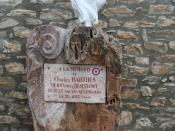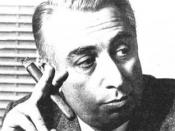Barthes' "Mythologies" is a criticism of modern consumerist society. In the 1950s, when the essays were written, there was nothing at all new about criticism directed at "bourgeois" society; Marx had written more than a century earlier of how the bourgeoisie maintained their unjust position of luxury at the top of society by exploiting the working classes. What is unique about "Mythologies" is the approach Barthes chooses for his attack on "bourgeois" society. While Marx had used devices such as rhetoric, presentation and interpretation of statistics, and affirmative repetition of supposed truths, Barthes writes in a way that seems to the reader to be more scientific and convincing. Reading his essays, one has the impression of reading an unbiased observation of different aspects of 1950s society. It is as if they were written by someone who was experiencing this society for the first time and jotting down his observations in the way someone might do so in a travel journal when in a completely foreign land.
Accordingly, the reader of these essays is not aware of a propagandistic purpose in the same way as one is when reading a book such as "The Communist Manifesto".
This is probably exactly the effect that Barthes wanted to create. After all, people are more likely to believe something if they reach a conclusion by themselves through observation and reflection than if they are simply told that such and such is the truth. Barthes' "Mythologies" essays appear to be neutral, un-predisposed observations that do not tell the reader what conclusion he should come to but rather just lay the facts in front of him and let him make of them what he will. Of course there is bias in the essays- Barthes chooses his topics carefully and even at times twists the...


